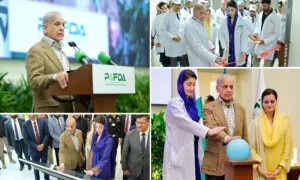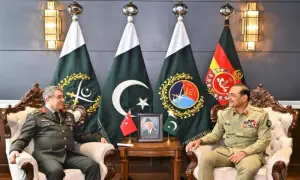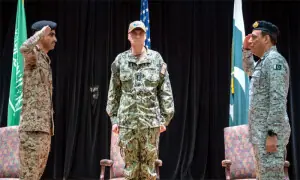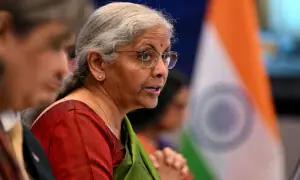Political unity, institutional harmony essential for economic revival: Asad Umar
2 min readFormer Finance Minister Asad Umar has warned that Pakistan is growing increasingly isolated on the global stage, as even smaller nations actively engage in international affairs while Pakistan remains absent.
He made these remarks on Thursday during the closing session titled “The Big Picture” at the 8th edition of the Leaders in Islamabad Business Summit (LIIBS), the country’s premier corporate event.
Highlighting Pakistan’s strategic geographical advantage, Umar said the country holds immense potential for trade and economic growth, but this potential cannot be realised without political stability and national cohesion. He stressed that now is a time for strategic patience and foresight, drawing a parallel to the Treaty of Hudaybiyyah — emphasising that real, long-term success comes through preparation rather than confrontation.
He urged the government to prioritise inclusive governance by uniting all ethnic communities and promoting national unity. According to him, a transparent industrial policy and a serious approach to microeconomic reform are critical to restoring investor confidence and attracting both local and foreign capital.
Umar said Pakistan’s fundamental problem lies in its resistance to changing outdated mindsets. Comparing Pakistan’s stagnation with India’s rapid economic rise, he pointed out that internal conflicts — within institutions, political leadership, and society at large — are holding the country back.
The former minister emphasised the need for Pakistan to evolve into a true constitutional democracy, stating that the constitution must serve all citizens equally, not just the interests of a few. He also advocated for empowering local governments, asserting that grassroots governance is the only way to address real public needs effectively.
He warned that a weak parliament cannot uphold a strong democracy and criticised growing political interference in the judiciary, which he said is eroding public trust in the legal system.
Echoing Umar’s views, former Prime Minister Shahid Khaqan Abbasi said the rule of law is foundational to genuine progress. He emphasised that political instability doesn’t just affect politicians — it disrupts policymaking, deters investment, and weakens governance.
Shahid Khaqan Abbasi: No one is safe in current circumstances
Abbasi also called for empowering the Economic Coordination Committee (ECC) of the Cabinet, suggesting that the body be given the authority to make consistent and decisive economic decisions in coordination with other institutions.
Both leaders agreed that without unity, transparency, and institutional synergy, even well-intentioned policies are bound to fail.
For the latest news, follow us on Twitter @Aaj_Urdu. We are also on Facebook, Instagram and YouTube.























Comments are closed on this story.